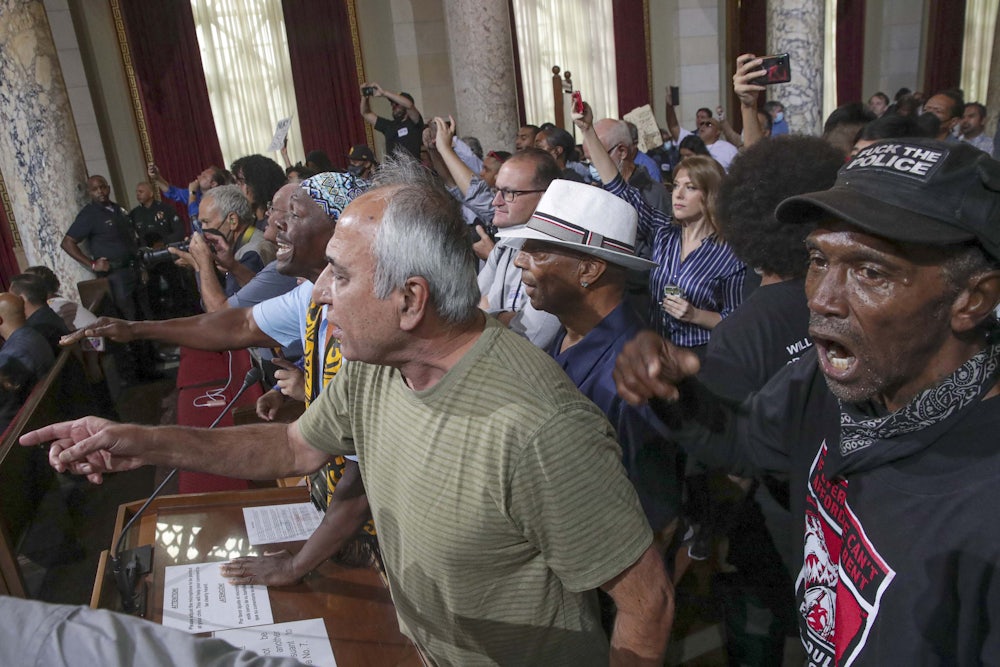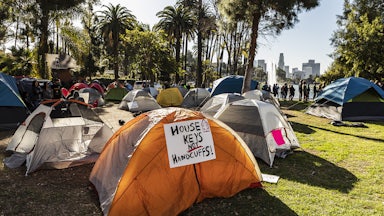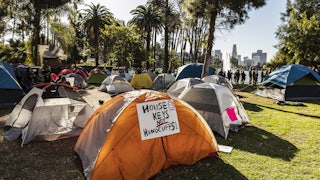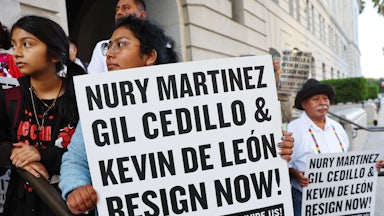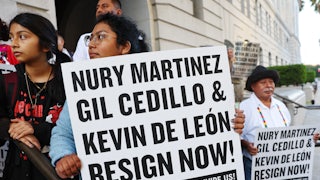In the hour-long tape that captured Los Angeles City Council members trading slurs during a closed-door meeting last year, few were spared. Nury Martinez, Kevin de León, Gil Cedillo, and L.A. County Federation of Labor President Ron Herrera disparaged their colleagues—particularly Councilmember Mike Bonin, whose 3-year-old son occasioned some of the group’s most vile comments—and their constituents, picking out Black, Oaxacan, Korean, Jewish, Armenian, poor, and unhoused people for ridicule. Recorded in secret in October 2021 and leaked anonymously almost a year later, the roving conversation was suffused with expletives and epithets, as the speakers alighted on political allies and enemies. At the time, the council—a 15-member body tasked with representing more than four million people—was in the middle of redistricting. “I get what we have to do,” Herrera summarized: “just create districts that benefit you all.” As if courting the judgment of Solomon, Martinez repeatedly referenced plans to “slice and dice the baby.”
What the officials said has rightly stirred outrage. But they deserve more criticism for what they were doing at the time: gerrymandering council districts to explicitly undermine the power of tenants. Besides ruining four political careers (so far, Martinez and Herrera have resigned; Cedillo and de León were stripped of committee appointments), this moment will be meaningful only if we connect the council members’ racist speech to their racist practice of class domination and tenants recognize that the political process is rigged against the propertyless. At bottom, the scandal reveals not a racial or ethnic alliance so much as an alliance between the state and real estate.
The lever the council used to turn its racist animus into racist action was the suppression of tenant power. The district held by Nithya Raman was “the one to put in a blender and chop up left and right,” de León said, months into his mayoral campaign. “It serves us not to give her all of K-Town,” agreed former Council President Nury Martinez, “because that solidifies her renters’ district, and that is not a good thing for any of us.” It’s easy to see the council members’ deliberate gerrymandering as an attack on a progressive political opponent, but it was equally an attack on the people they disparaged—“dark,” “little,” “shoeless,” “ugly,” “cocoa,” those from the “village,” and those with nowhere “to shit.”
Just as the “war on drugs” and the “war on crime” were in effect wars on the poor and people of color, L.A. City Council has waged a war on tenants with the same results. The majority of L.A.’s Black and brown residents are tenants—specifically, those tenants who have highest rent burdens and live in the worst conditions. Given this reality, this council’s record of tenant policies is as damning as the tapes. “If legislation benefited renters … it was in trouble,” Bonin wrote Tuesday, cataloging the roadblocks the trio had erected to prevent tenant reforms. (Councilmember Marqueece Harris-Dawson chimed in to agree.) Under these members’ tenure and Martinez’s leadership, this council failed to enact a true eviction moratorium during the pandemic. Thousands likely lost their homes, whether because they were harassed by their landlords, pushed out by poor conditions, evicted by default judgments for forsaking arcane procedure, or expelled in court, where tenants lack access to public defense. This council starved its housing department of funds, hollowing out the few protections tenants have—an anti-harassment ordinance, for instance, has failed to help a single person yet. Forcing tenants from their homes as rents surge, the council’s policies exacerbate decades of state-sanctioned displacement, by which Black and brown communities are not just shuffled but removed from the city altogether.
Of course, those who can’t afford to move make their homes on the street. This council made it a priority to banish and incarcerate unhoused tenants, who are disproportionately Black; Black people make up 9 percent of the county’s population but 42 percent of its unhoused. In 2019, the council placed expansive restrictions on living in cars. In 2021, it rushed to restart encampment sweeps, which had been paused for a year of the pandemic. Then it circumvented a constitutional injunction to revive the city’s “sit-lie” law, 41.18, to make camping, sitting, or lying down in public a crime in most of the city, subject to fines and imprisonment. In 2022, it banned bike repair on the street. Finally, the council increased the budget, staff, and discretionary powers of a police department that disproportionately targets, harasses, and murders Black and brown people, expanding a penal system that disproportionately cages them.
In other words, these council members promote policies that produce homelessness and then criminalize it, entrapping tenants, predominantly tenants of color, in a cycle of eviction and incarceration. The recipe—withdrawing protections and resources while policing the chaos withdrawal creates—reveals racism not as mere speech but as practice; not as simple prejudice but as power: It produces unequal lives and premature deaths.
“The whole picture,” said Leonardo Vilchis, who has organized in Boyle Heights for three decades and co-founded the LA Tenants Union (a dues-funded union I also helped start), “is that racism is a tool to enforce class division.” (Vilchis and I are collaborating on a book about our work.) On the tape, officials suggested they were colluding in order to preserve a “Latino caucus.” Yet they contradicted their own claims of race-based alliances throughout. The members praised Black council appointee Heather Hutt for her obedience to their own group and called white Councilmember Mitch O’Farrell Nury’s “boy” and an “ally.” Meanwhile, Hugo Soto-Martinez, a Latino politician who defeated O’Farrell in the primary this June, was an “entitled” “opponent.” The officials referred to white Councilmember Mike Bonin, a leftist, as the council’s fourth “Black member” and said of Los Angeles County District Attorney George Gascón—elected to limit sentence terms, the prosecution of minors as adults, and the death penalty—“He’s with the Blacks.” The comments suggest that solidarity across racial division is still possible—in preservation or in resistance of class rule.
For decades, Vilchis told me, Los Angeles residents were promised, “Vote for your race, that will change your conditions.” But that promise has been betrayed. The same week of the leak, the council voted unanimously to end the pandemic tenant protections that still keep thousands in their homes. This scandal forces a reckoning with the central fault line of power in the city, with which race intersects and from which it also distracts: real estate versus tenants. Tenants make up 63 percent of L.A. residents and constitute majorities in 12 of the city’s 15 council districts. Not one council member is a tenant; rather, most extract income—i.e., collect working people’s wages—as landlords. Favors between the real estate lobby and the council run both ways: Industry donations line members’ campaign chests; the council approved $1 billion in tax incentives for developers in less than 15 years. Often, it seems, proximity corrupts, as in 2018, when council member José Huizar was indicted for accepting developer bribes and ousted from his role. But in the city that invented a literary and film genre—noir—to describe real estate’s political influence, scandal is hard to distinguish from the everyday.
The tape is a candid portrait of the Democratic machine in a one-party state: Politicians leverage their power to court financial speculation at the expense of the residents they claim to serve. Members can be heard on the tape jockeying for economic “assets,” which include infrastructure, manufacturing, sports stadiums, and large residential projects. Assets drive campaign contributions from investors, serve as bargaining chips for members to negotiate “benefit agreements” with nonprofit and labor groups, and pad their reputations. Martinez said one councilmember, Curren Price, “needs those assets to run for reelection. That’s his platform: job creation and economic development.” But these assets, Vilchis insisted, “do not change the conditions of the community” or improve the quality of life of those who live there. The trio’s stalwart support of the Olympics—Herrera sat on the organizing committee—makes this contradiction clear: The games benefit investors and tourists, while locals get displaced and policed. Members fight a “war for territory, trying to build their own kingdoms,” in Vilchis’s words. But “the casualties of this war are the poor.”
“I might not be that tall, but I don’t feel little,” Inez Alcazar, a member of the Flower Drive Tenants Association, told me, referencing the comments Martinez made about Oaxacan immigrants like her. Alcazar’s council member, Curren Price—whom Martinez said would “come with us”—reflects the mundanity of real estate’s hold on L.A. In 2019, Price came under investigation for approving development deals for his wife’s consulting clients. Last year, he helped displace entire buildings of rent-stabilized tenants on the block next to Alcazar’s. Within a web of false promises and favors, “the nonprofits were there to negotiate between the councilman and developers to put these people out on the streets,” Alcazar said. Organizing with the L.A. Tenants Union, Alcazar is refusing that fate for herself and her neighbors, drawing power outside of the rigged electoral process, from tenants themselves.
“For Los Angeles to heal, and for its City Council to govern, there must be accountability,” Mitch O’Farrell wrote on Saturday, joining a chorus that includes President Joe Biden in calling for all of his colleagues to resign. But a race for “healing” attempts to quarantine the scandal to those caught on tape. Of course, O’Farrell himself is contaminated. On the other recording published in the leak, one of O’Farrell’s staffers can be heard planning to “buy” endorsements for O’Farrell’s campaign. The redistricting overseen by the City Council added three precincts that broke for O’Farrell in the primaries this spring. “Every vote, every decision is tainted,” Vilchis reminded me. Beyond proposals to expand the council, beyond a formal investigation of the redistricting process, the council members “need to resign, review, and reset: resign from their posts, review all the decisions they touched, and reset political participation in the city.”
For Los Angeles, business as usual means 600,000 tenants spend 90 percent of their income on rent. Business as usual means more than 69,000 residents are unhoused. Business as usual means council members are elected with slim support—Martinez claimed just 6,625 votes, or 2.5 percent of her district—and little understanding of their constituents. (The tape recorded her apparent surprise both at the location of K-Town and the fact that Latinos lived there.) Business as usual means labor leaders strike a devil’s bargain with development to undermine workers’ need for a home. The hoarding of political power in the hands of the real estate elite relies on the continued disenfranchisement of L.A.’s tenants. Yet tenants across the city should recognize that deliberate attempts to undermine our power reflect just how much we could have. On Tuesday, despite widespread calls to cancel meetings, the absence of four of 15 members, protests stationed outside their houses, and the threat of leaks to come, council members returned to business as usual. They voted to elect a landlord as council president. With City Hall closed out of concern for Covid-19, Mitch O’Farrell presided over empty chambers.
